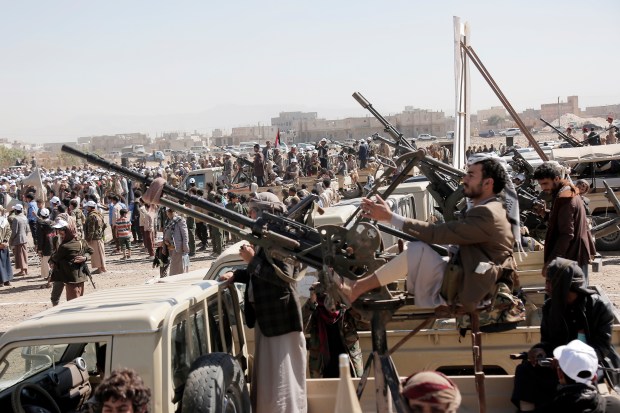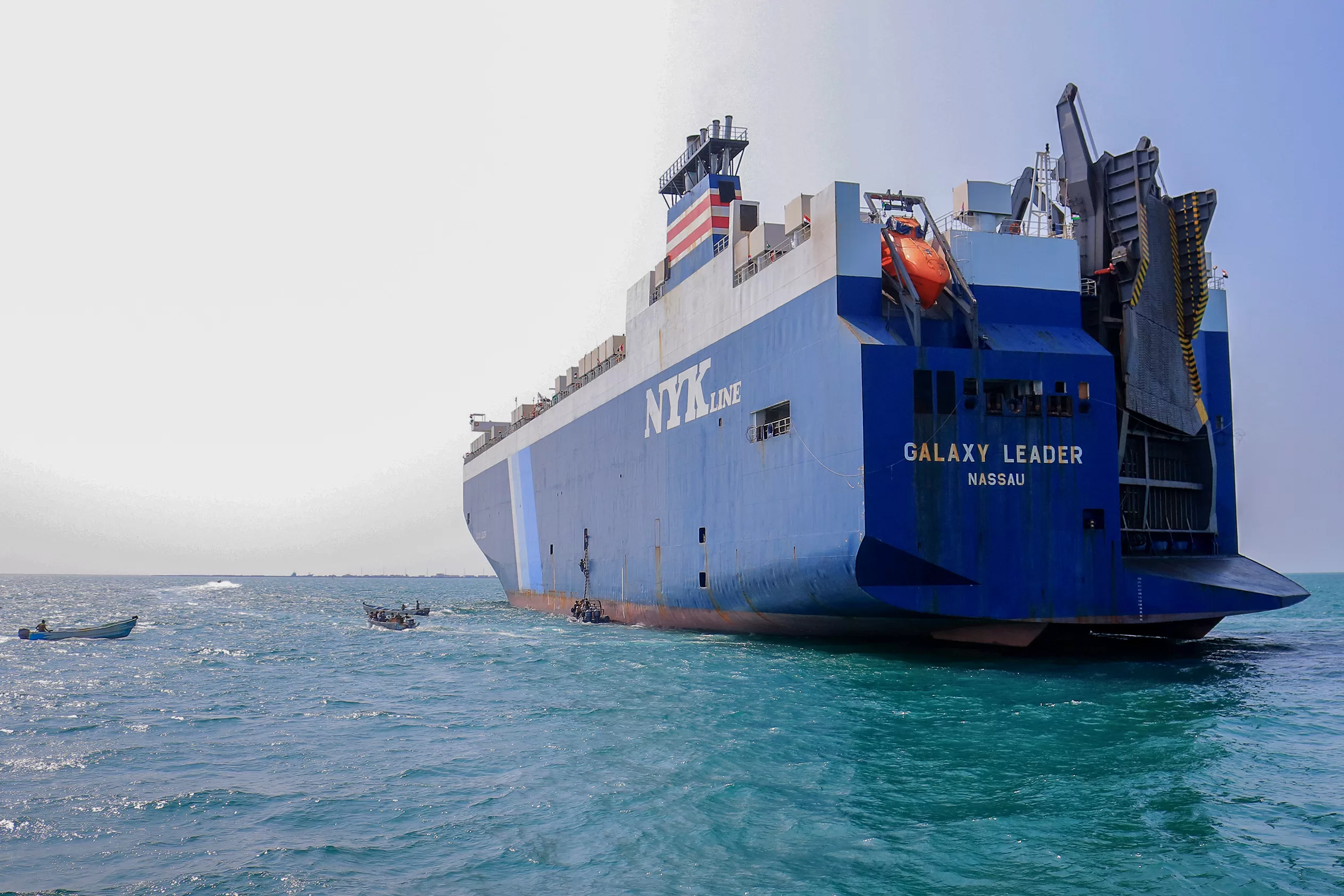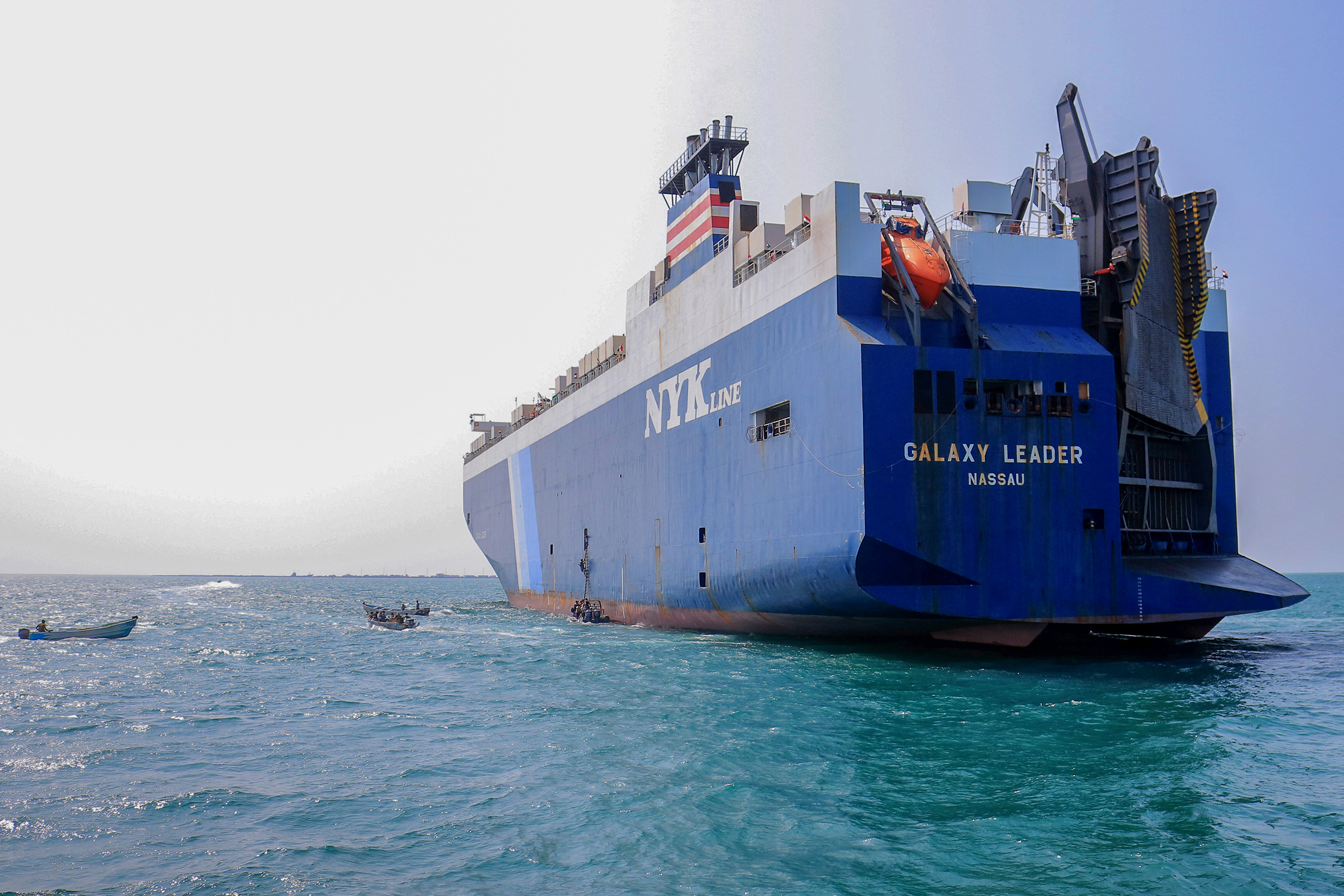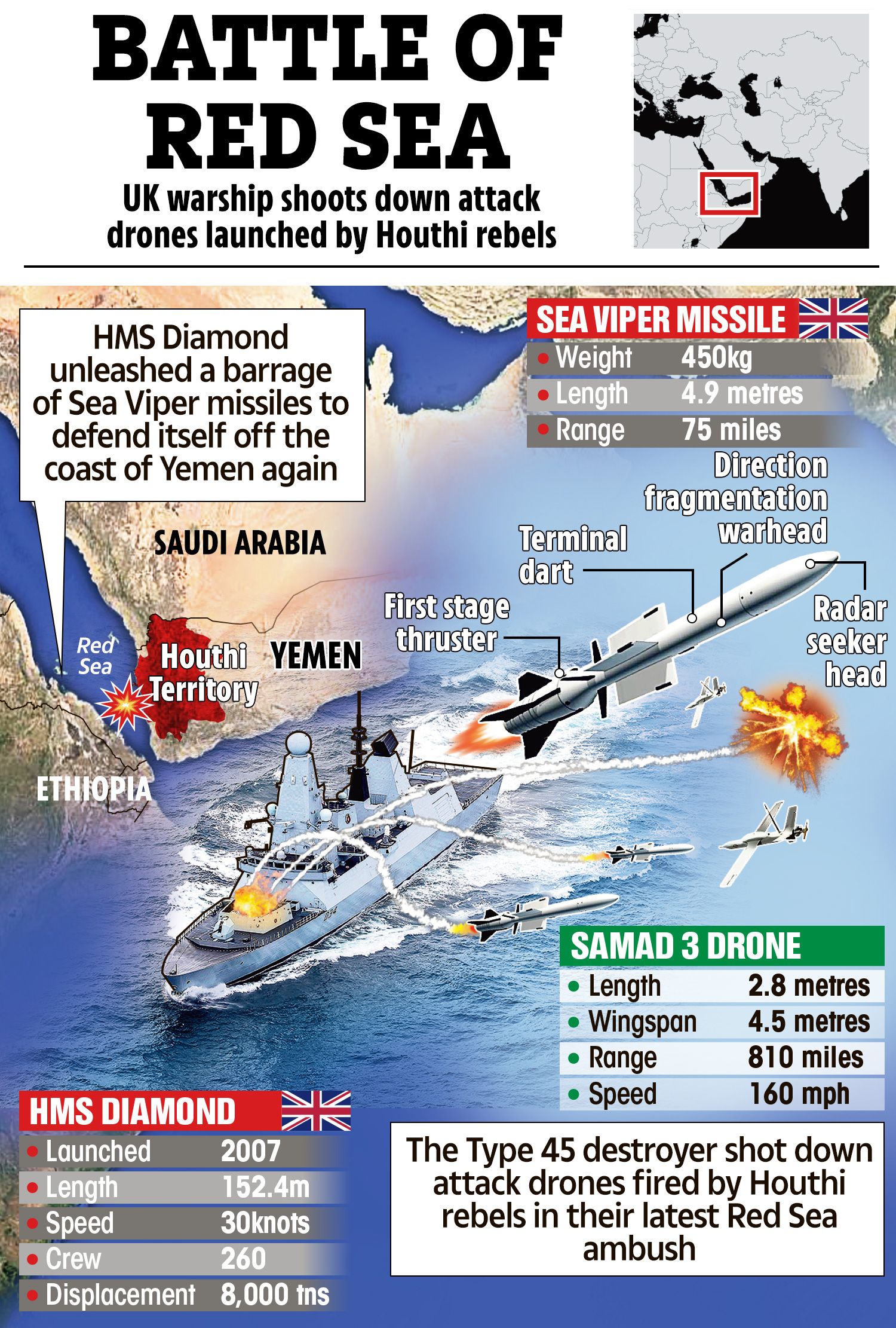The Galaxy Leader cargo ship was seized in November and sailed to Yemen where all-male groups travel from far and wide to tour what the terror group hail as their biggest war trophy.
On November 19, gunmen belonging to Yemen’s Houthi rebels jumped from choppers and attacked the Japan-chartered container ship, taking its entire crew hostage.
Little is still known of the fates of its 25 crew members.
The Galaxy Leader is owned by a British company, which is in turn partially owned by Israeli tycoon Abraham Ungar.
The militants – who said they were acting in “solidarity” with people in the besieged Gaza Strip – later sailed it back to Yemen and opened it up as a designated “tourist cruise ship”.
For about a dollar per trip, male-only groups of visitors can board wooden boats five times a week to marvel at the hijacked carrier.
The Houthis, now designated a “global terrorist” group by Washington, draped it in Yemeni and Palestinian flags and anti-American and anti-Israeli banners.
The twisted rallying cry of the terror-waging pirates is “Death to America, Death to Israel, curse the Jews and victory to Islam”.
Shortly after the October 7 attacks sparked a war breaking out between Israel and Hamas in Gaza, the rebels launched a spate of missile and drone attacks on passing commercial ships.
The Houthis state their intention is to avenge Israel’s offensive in Gaza against Hamas, but they have been targeting ships with little or no link to Israel – turning one of the world’s biggest shipping lanes into an active warzone.
Around 12 percent of all global trade normally passes through the Bab el-Mandeb Strait, the now-under-attack 20 mile-wide stretch of Red Sea also known as the “Gate of Tears”.
A US-led naval coalition has responded by aggressively patrolling the Red Sea, and US and British forces have struck Houthi military sites across Yemen to keep open the vital shipping lane.
But this has done little to deter the Iranian terror proxy or to dampen the mood on the sightseeing trips to the seized vessel.
On a recent visit, Zubair al-Haidari, from the Houthi-controlled capital Sanaa, said he had travelled for five hours to see the “Israeli ship” anchored off Hodeida on the Red Sea coast.
It is our “pride and honour… that our armed forces have accomplished this wonderful work in supporting our oppressed brothers in Palestine and in Gaza.”
He was among some 10 visitors taking pictures with their mobile phones as they chewed khat, a plant that generates a mild high and is widely consumed in the Arabian peninsula’s poorest country.
Onboard the ship, some visitors performed a traditional dance featuring the daggers that many Yemenis carry tucked into their belts, accompanied by chants glorifying the Houthis.
On the deck of the Galaxy Leader, most of the visitors said they had seen the 25 crew members, who are Bulgarian, Filipino, Ukrainian and Mexican.
Hizam al-Assad, of the Houthi political bureau, referred to the Galaxy Leader as a “tourist attraction” and said the visitors were “proof that the Yemeni people… are impatient to meet the enemy and confront him”.
Another visitor, Hamada al-Baydani, said he had travelled 250 miles from Al-Bayda, to see the seized ship, which he labelled “a source of pride for Yemenis”.
Several days after detaining the vessel, the Houthis published a video showing a military general welcoming a group they said was the crew, but the militants have not provided any information on their fate since.
After an hour onboard under the scorching sun, the visitors made their way back home, chanting “death to America, death to Israel”.
One visitor, dubbed “Tim-Houthi Chalamet”, managed to make his trip onboard the Galaxy Leader go viral after his twisted fans gushed over his good looks.
Rashid Al Haddad, 19, with his brown curly locks, posted videos of himself on TikTok posing next to the stolen ship and chanting the slogans of his Houthi terror pals.
Who are the Houthis?

THE Houthi rebels are terrorising the Red Sea by launching persistent missile and drone attacks on vessels and warships – but who are they?
The Shia militant group, which now controls most of Yemen, spent over a decade being largely ignored by the world.
However, since the outbreak of the Israel-Gaza war they sprung from relative obscurity to holding roughly £1trillion of world trade hostage – turning one of the world’s busiest shipping lanes into an active warzone.
Their warped slogan is “Death to America, Death to Israel, curse the Jews and victory to Islam”.
Why are they attacking ships?
The rebel group has been launching relentless drone and missile attacks on any ships – including warships – they deem to be connected with Israel in solidarity with their ally, Hamas.
However, in reality there have been frequent attacks on commercial vessels with little or no link to Israel – forcing global sea traffic to halt operations in the region and sending shipping prices soaring.
The sea assaults have threatened to ignite a full-blown war in the Middle East as intense ripples from Israel’s war in Gaza are felt across the region – with Iran suspected of stoking the chaos.
Houthi attacks in the Red Sea increased 50 per cent between November and December as the rebel group’s chiefs pledged their assaults would continue until Israel stopped its offensive in Gaza.
And despite repeated threats from the West and joint US and UK strikes blitzing their strongholds in Yemen – Iran’s terror proxy appears undeterred.
It comes as Royal Navy destroyer HMS Diamond was forced to defend itself against a Houthi drone ambush on Saturday.
The UK Ministry of Defence said they had “successfully repelled” the Houthi attack using Sea Viper missile- which marked only the third time a Type 45 destroyer has deployed the devastating weapons.
Defence Secretary Grant Shapps said on Sunday that Britain “remains undaunted” by the drone assault.
Just weeks ago the same warship was hit in what Shapps dubbed the biggest attack from the Iranian-backed Houthis in the Red Sea to date.
Last Friday, a burning British oil tanker was rescued off the coast of Yemen after it was struck by a missile.
The Houthis – increasingly emboldened in recent weeks – claimed responsibility for the chilling revenge attack on the Marlin Luanda ship, which burst into flames in the Gulf of Aden.
Meanwhile, US officials announced yesterday that a deadly drone attack on a US base in Jordan hit the troops’ living quarters, leading to a large number of casualties.
Three US troops were killed and another 34 were injured in the attack – marking the first time American troops have been killed by enemy fire in the Middle East since the beginning of the Gaza war.
President Joe Biden said on Sunday that the US will “respond” and “hold all those responsible to account at a time and in a manner of our choosing”.
He added: “While we are still gathering the facts of this attack, we know it was carried out by radical Iran-backed militant groups operating in Syria and Iraq.”









